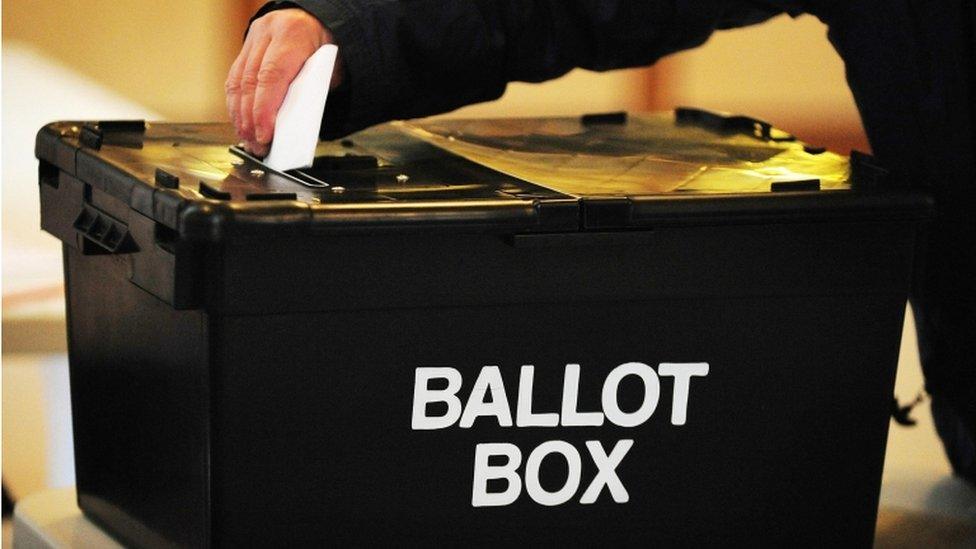General election 2017: 'I'm 8,000 miles from home, but that won't stop me voting'
- Published
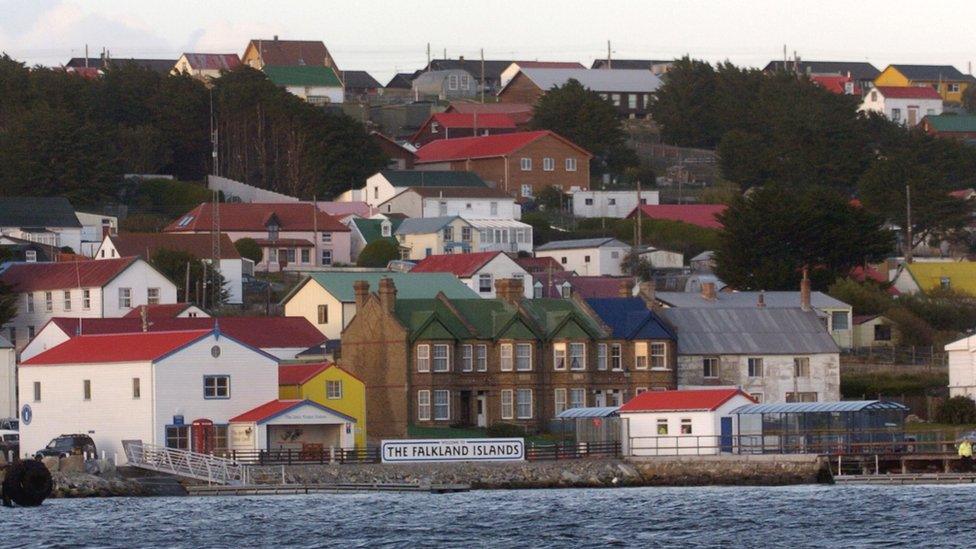
Stanley in the Falkland Islands, from where Peter Young will vote in the general election
When politicians talk about hard-to-reach voters, there is one group that is - quite literally - harder to reach than others: the overseas electorate.
The number of people who live abroad, but who are registered to vote in the UK, has increased tenfold, external in the past three years.
In December 2013, there were only 26,000. By December 2016 - after a campaign by the Electoral Commission - there were 264,000.
That's equal to almost four UK constituencies.
British citizens living overseas are able to vote for 15 years after leaving the UK. So - in theory - someone who hasn't set foot in Britain since 2002 can vote on 8 June.
The votes are counted in the voter's most recent UK constituency, meaning someone in Delhi could help choose an MP for Darlington.
Overseas voters can vote by post or proxy - that is, they nominate a friend or relative to vote on their behalf.
The Electoral Commission recommends voting by proxy, because of possible delays in the postal system.
The BBC asked three of the election's most remote voters why they're determined to cast their ballot.
Peter Young, Falkland Islands (7,900 miles from Westminster)
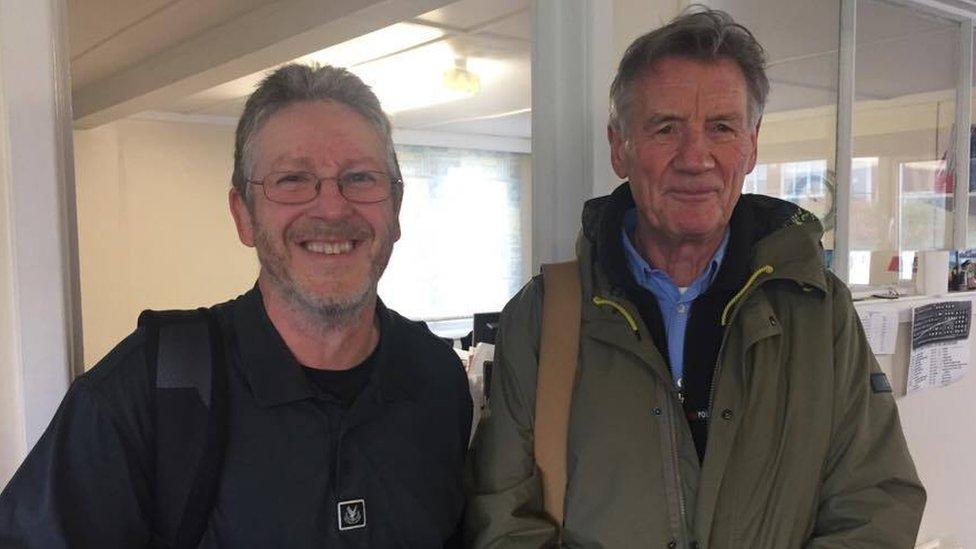
Peter Young (left) while interviewing Michael Palin in the Falklands in March
Peter, 61, moved to the Falkland Islands in January 2012 when his wife, Annie, took a job as a taxation officer with the Falkland Islands government.
Since then, he has taken on a range of jobs, including tour guide, climbing instructor, and currently works for the islands' newspaper, Penguin News.
Originally from Ayrshire, his most recent UK home was in Teddington in south-west London, part of the Twickenham constituency.
"I have to confess, I didn't vote in the EU referendum," he says.
"I feel stupid for not doing it. It's too tight to vote by post, so for the general election I applied for a proxy vote.
"I contacted voter registration at Richmond Council, and did it all via email. It only took two days.
"We discussed it with friends, and they're happy to take a stroll on voting night and cast the vote on our behalf.
"It's something that's going to affect our futures. I'll be paying attention to the results, even though we're so far away."
Timothy Abraham, French Guiana / Suriname (4,500 miles from Westminster)
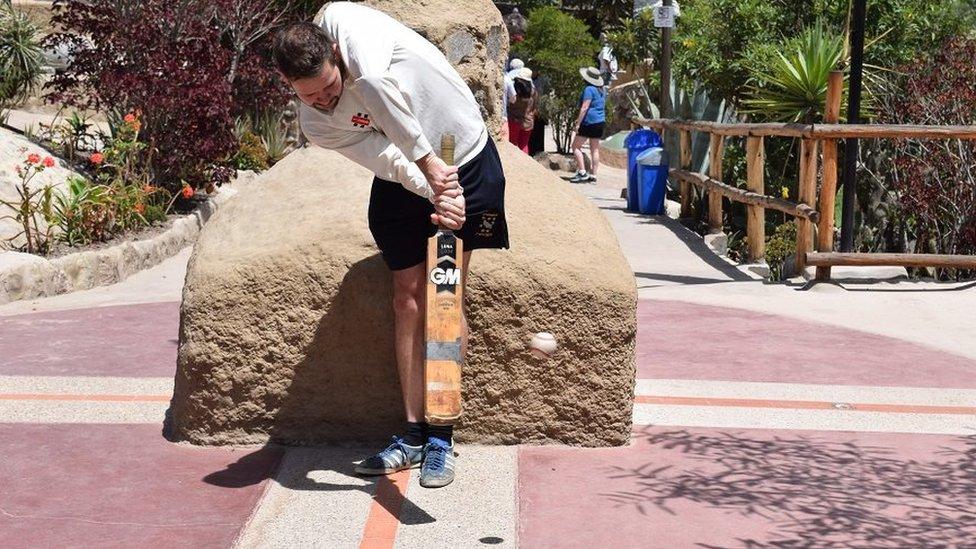
Timothy playing across the line at the equator in Ecuador
Timothy Abraham, 36, is co-writing a book about the history of cricket in Latin America.
Currently in Brazil, he expects to be in Suriname or French Guiana on 8 June. Although from Liverpool, Timothy will vote by proxy in his parents' constituency of Vale of Clwyd in north Wales.
"In 2015 the seat changed hands to the Conservatives after 18 years with Labour," he says.
"Just 237 votes separated the two candidates last time out, so unlike some other constituencies, I know my vote is likely to really count here.
"I don't always see eye-to-eye with my parents on politics - there were some lively debates over Brexit - but fortunately one of them will turn up and cast the vote on my behalf."
While away from home Timothy, a politics graduate, has kept a close eye on current affairs in the 16 countries he has visited.
"People in Latin America are passionate about their politics," he says.
"The last few weeks in Brazil have been dominated by ex-president Lula answering corruption charges.
"While I was in Paraguay I saw first-hand violent protests against plans by president Horacio Cartes to change the constitution.
"On 8 June I expect I'll be asked a few questions about events back home, and of course I'll be keeping a very close eye on things."

How to vote from abroad
Register in the normal way, external - the deadline is 22 May
To vote by post, applications must be in by 5pm on 23 May
To vote by proxy, applications must be in by 5pm on 31 May
The deadline for absent vote applications in Northern Ireland has passed

Kate Shaw, Ghana (3,200 miles from Westminster)
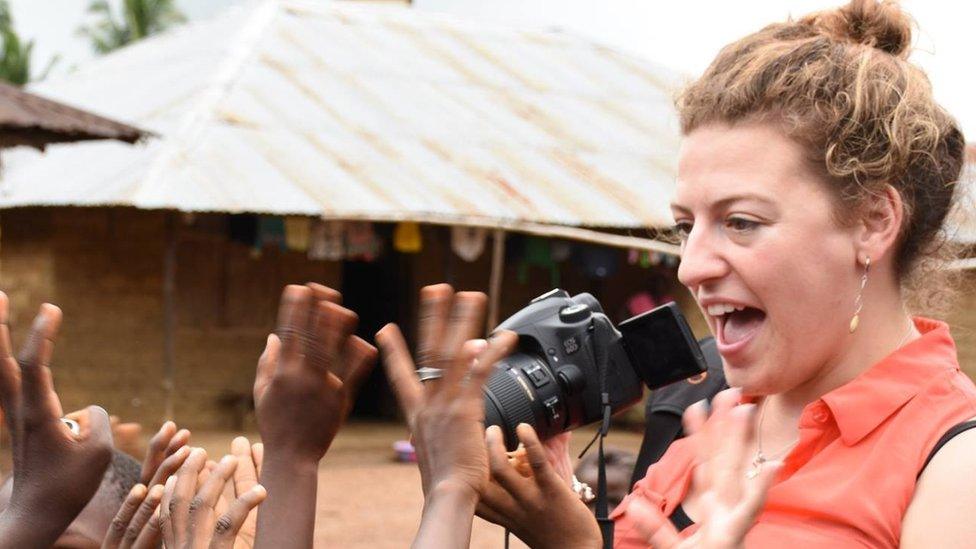
Kate Shaw during a previous role in Sierra Leone
Kate Shaw, 28, moved to Ghana in January. Via the British organisation Voluntary Service Overseas, external, she is spending a year working for a charity in the west of the country.
After growing up in the US, Kate moved full-time to the UK in 2012. She has American and British citizenship, and most recently lived in Wandsworth in south London, part of the Battersea constituency.
Like Peter and Timothy, she is voting by proxy. "Post doesn't really come to this part of Ghana, unless they can FedEx the ballot paper for me," she says.
Kate, who will move back to London in January, votes in both the UK and the US.
"It's really, really important to vote," she says. "When there's so much extremism, it's really important to participate in the political process."
And being abroad has increased Kate's appreciation for the British system.
"Ghana is one of the more stable, more democratic countries in sub-Saharan Africa," she says.
"But they've recently had an election (in December 2016) and there's a massive system of patronage (the power of leaders to make appointments and award privileges).
"It makes you appreciate the other systems. It makes you appreciate the checks and balances we have."
- Published7 October 2016
